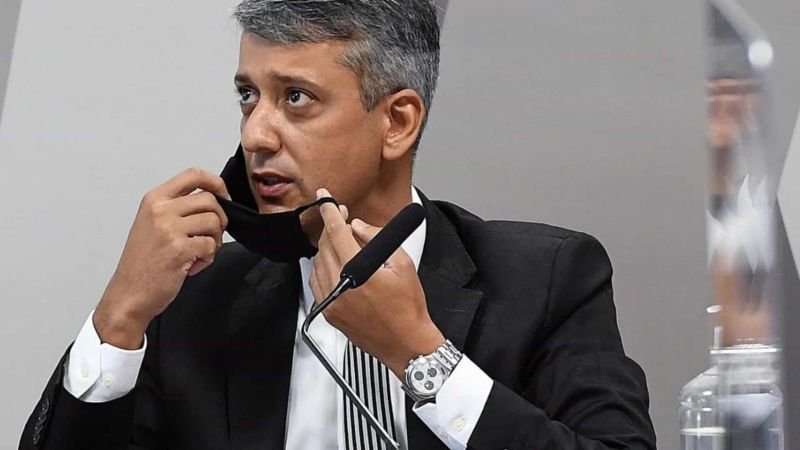RIO DE JANEIRO, BRAZIL – During testimony before the Senate Covid CPI on Wednesday, former Health Ministry director Roberto Dias was arrested in flagrante for giving false testimony.
The order came from the chairman of the committee, Senator Omar Aziz (PSD-AM), after the revelation of audios that contradicted the testimony by Dias about a chance encounter with state police Corporal Luis Paulo Dominguetti, in a restaurant in Brasilia, where the policeman says that the former director asked for a bribe of one dollar per dose of vaccine.

After testifying as a witness in a parliamentary investigative commission, going to jail is rare in Brazil but not unheard of, and is provided for in the 1988 Federal Constitution. Under the federal law that created the CPIs, when testifying before such a committee, a witness must tell the truth.
The law lists two possible grounds for arresting a witness: “making a false statement or denying or concealing the truth as a witness” and “obstructing or attempting to obstruct, by force, threat, or harassment, the proper work of the commission” or “the free exercise of the powers of one of its members.
Article 342 of the Criminal Code provides, in addition to a fine, for the imprisonment of two to four years for anyone who “gives false testimony or denies or conceals the truth as a witness, expert witness, accountant, translator, or interpreter in a judicial or administrative proceeding, a police investigation, or an arbitration tribunal.
OTHER CASES
The Federal Senate’s online portal lists at least five cases in which witnesses were arrested while leaving a CPI hearing. In 1999, former Central Bank President Francisco Lopes was arrested less than 30 minutes after a Bank CPI session. He refused to sign an undertaking to tell the truth.
Lopes’ attitude was interpreted by senators as obstruction of justice. At the time, the president of the committee, Senator Bello Parga (PFL-MA), ordered his arrest based on the precepts of insubordination to a public official in the exercise of his function and disrespect for authority. He was taken to the Federal Police and released the same night after posting bail.
In 2004, the former mayor of São Paulo, Celso Pitta, was arrested after contemptuously attacking the president of the CPI on Banestado, then-Senator Antero Paes de Barros (PSDB-MT). The committee was investigating money laundering, and Pitta felt insulted when asked if he was corrupt.
He responded to the president by asking how he would feel “if someone asked if he continued to beat his wife.” Antero saw himself as a victim of contempt for authority and called the police, who took the former mayor to the Federal Police Inspectorate in Brasilia.
Also, at the Postal CPI in 2006, a meeting was interrupted by the arrest of a witness. During a hearing in January, lawyer Marcus Valerius Pinto de Macedo was arrested after insulting Congress. When I mentioned the possibility of accessing Macedo’s bank, tax, and telephone records, he replied, “Why don’t you ask for your mother’s as well?
PLANALTO SEES DESPERATE ATTEMPT TO BRING DOWN BOLSONARO
The Brazilian government sees the arrest of Roberto Ferreira Dias as a “desperate attempt” to tarnish President Jair Bolsonaro.
Asked about the arrest, a close associate of President Jair Bolsonaro criticized the process.
Dias was fired last week after being accused of demanding a bribe in exchange for contracts to sell vaccines to the Health Ministry.

